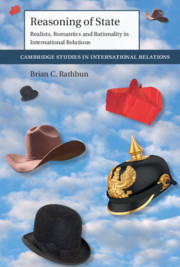Book contents
- Reasoning of State
- Cambridge Studies in International Relations: 149
- Reasoning of State
- Copyright page
- Dedication
- Contents
- Acknowledgments
- Introduction: Three Theoretical Arguments, Four “Great Men” of History, Multiple Methods and Disciplines
- 1 The Psychology of Rationality: Cognitive Style in International Relations
- 2 The Three “R”s of International Relations: Realism, Romanticism, and Rationality
- 3 Little Bismarcks: A Laboratory Experiment on Variation in Rational Thinking and Rational Behavior (with Joshua D. Kertzer)
- 4 The “Prince” among Men: Bismarck’s Realpolitik in Prussian Politics
- 5 Cold Blood and Iron: Bismarck, the Struggle with Austria, and German Unification
- 6 Blind Faith: Richelieu, the Devoted, and France in Counter-Reformation Europe
- 7 “Blood, Toil, Tears, and Sweat”: Churchill, Romanticism, and the Rational Appeasement Debate
- 8 “In Defeat, Defiance:” Churchill in Words (1935–1939) and in Deeds (1940)
- 9 “Beginning the World All Over Again”: Resolving the Paradox of Ronald Reagan
- 10 Winning One as the Gipper?: Reagan’s Administration and American Engagement with the Soviet Union
- Conclusion
- References
- Index
- Cambridge Studies in International Relations
- References
References
Published online by Cambridge University Press: 11 February 2019
- Reasoning of State
- Cambridge Studies in International Relations: 149
- Reasoning of State
- Copyright page
- Dedication
- Contents
- Acknowledgments
- Introduction: Three Theoretical Arguments, Four “Great Men” of History, Multiple Methods and Disciplines
- 1 The Psychology of Rationality: Cognitive Style in International Relations
- 2 The Three “R”s of International Relations: Realism, Romanticism, and Rationality
- 3 Little Bismarcks: A Laboratory Experiment on Variation in Rational Thinking and Rational Behavior (with Joshua D. Kertzer)
- 4 The “Prince” among Men: Bismarck’s Realpolitik in Prussian Politics
- 5 Cold Blood and Iron: Bismarck, the Struggle with Austria, and German Unification
- 6 Blind Faith: Richelieu, the Devoted, and France in Counter-Reformation Europe
- 7 “Blood, Toil, Tears, and Sweat”: Churchill, Romanticism, and the Rational Appeasement Debate
- 8 “In Defeat, Defiance:” Churchill in Words (1935–1939) and in Deeds (1940)
- 9 “Beginning the World All Over Again”: Resolving the Paradox of Ronald Reagan
- 10 Winning One as the Gipper?: Reagan’s Administration and American Engagement with the Soviet Union
- Conclusion
- References
- Index
- Cambridge Studies in International Relations
- References
- Type
- Chapter
- Information
- Reasoning of StateRealists, Romantics and Rationality in International Relations, pp. 310 - 330Publisher: Cambridge University PressPrint publication year: 2019



